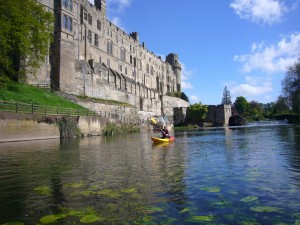I’ve had a cracking day today. I did the Doggy Paddle—a 19 mile kayak trip from Leamington Spa to Stratford upon Avon. It’s a gorgeous journey through Warwickshire countryside, with some of the finest views you can get of Warwick Castle and Charlcotte Park. And it’s a trip you can only do on one day each year.
 Like so many of the rivers of England, much of this stretch of the Avon is privately owned. There’s no right to kayak along it. Unlike Scotland, in England we’re denied the right to enjoy our countryside and our heritage by quietly floating along the river. My journey today was made possible because the local canoe club negotiate with land owners to allow this annual fund raising event to take place.
Like so many of the rivers of England, much of this stretch of the Avon is privately owned. There’s no right to kayak along it. Unlike Scotland, in England we’re denied the right to enjoy our countryside and our heritage by quietly floating along the river. My journey today was made possible because the local canoe club negotiate with land owners to allow this annual fund raising event to take place.
It was wonderful to be able to put all the bits of river together. Some of it I have kayaked before, much of the rest I have seen on walks, or on visits to the Castle or Charlcote Park. Some of it was new to me altogether—I discovered a bridge I didn’t know existed. Highlights of the day include seeing the 16th century Charlcotte House emerging from behind the trees, and shooting my first weir. And I didn’t fall in! Check out Sophie’s photos of the day.
So why is it called the Doggy Paddle? Because the event raises money for the Guide Dogs for the Blind Association. Guide Dogs are a charity I’m very happy to support because I have seen what a difference they can make to someone’s life. When he was about 8 (I’m sure my mum will phone and correct me about that) my brother was diagnosed with Retinitis pigmentosa, a degenerative eye disease that causes tunnel vision, night blindness and eventually blindness.
Now in his forties, he still has some sight but it is extremely limited. A few years ago he decided to apply for a guide dog. The GDBA eventually matched him with a beautiful black Labrador named Yarran. It’s hard to describe what a difference Yarran has made to my brother’s quality of life. Loosing your sight takes away basic freedoms which we all take for granted. Walking down the road becomes a daunting ordeal. A guide dog can never give someone their sight back, but it can restore some of those freedoms. It brings independence, it brings the ability to get around, to go to the pub on a Friday evening or go for a walk on Sunday afternoon. Guide dogs make a huge difference to people with limited sight in a very basic way.
Training and looking after a guide dog costs around £50,000 through its life. The GDBA is funded entirely by charitable donations so fund raising events like the Doggy Paddle are vital to them. If you’d like to help them continue to provide this amazing, life changing service I’m still collecting sponsorship for my day’s adventure—just click the button below…

